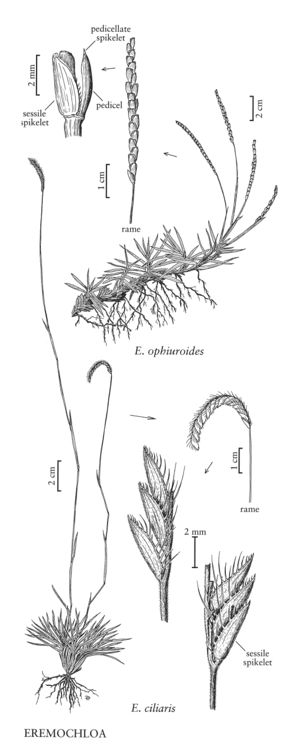Difference between revisions of "Eremochloa ciliaris"
FNA>Volume Importer |
imported>Volume Importer |
||
| (5 intermediate revisions by 2 users not shown) | |||
| Line 25: | Line 25: | ||
-->{{#Taxon: | -->{{#Taxon: | ||
name=Eremochloa ciliaris | name=Eremochloa ciliaris | ||
| − | |||
|authority=(L.) Merr. | |authority=(L.) Merr. | ||
|rank=species | |rank=species | ||
| Line 32: | Line 31: | ||
|basionyms= | |basionyms= | ||
|family=Poaceae | |family=Poaceae | ||
| + | |illustrator=Linda A. Vorobik;Hana Pazdírková | ||
| + | |illustration copyright=Utah State University | ||
|distribution=Calif. | |distribution=Calif. | ||
|reference=None | |reference=None | ||
| Line 37: | Line 38: | ||
|publication year= | |publication year= | ||
|special status= | |special status= | ||
| − | |source xml=https:// | + | |source xml=https://bitbucket.org/aafc-mbb/fna-data-curation/src/200273ad09963decb8fc72550212de541d86569d/coarse_grained_fna_xml/V25/V25_1649.xml |
|subfamily=Poaceae subfam. Panicoideae | |subfamily=Poaceae subfam. Panicoideae | ||
|tribe=Poaceae tribe Andropogoneae | |tribe=Poaceae tribe Andropogoneae | ||
Latest revision as of 17:57, 11 May 2021
Plants cespitose, sometimes shortly stoloniferous. Culms 30-70 cm, compressed, sometimes branching from the upper nodes. Leaves mostly basal; sheaths keeled, strongly distichous and imbricate, often loose, basal sheaths pubescent below; ligules to 0.6 mm, membranous; blades to 25 cm long, to 6 mm wide, flat or folded, basal blades glabrous. Rames 4-7 cm, straight to falcate; internodes 2-3 mm, clavate, shortly pubescent. Sessile spikelets 4-5 mm, ovoid-oblong; calluses pubescent; lower glumes elliptic, obscurely 7-9-veined, keeled, keels with conspicuous spines, basal spines to 3 mm, those near the apices to 0.3 mm; upper glumes 3-5-veined, keeled below; lower florets staminate; anthers about 2 mm, yellow; upper florets bisexual. Pedicels to 3 mm. Pedicellate spikelets not differentiated. 2n = 36.
Discussion
Eremochloa ciliaris is native to southeast Asia. It was collected in San Francisco in the nineteenth century, but has not been reported since from the Flora region.
Selected References
None.
